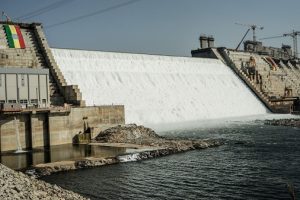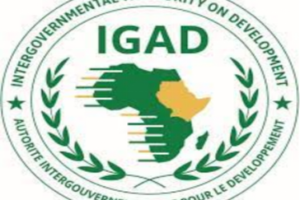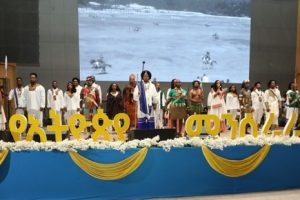BY FISTUM GETCAHEW
Part Two
What in fact followed the military rule was to be a highly centralized system led by a few individuals who built their own ‘family empire’ over the entire population. Many people have dubbed this system as highly oppressive and in fact the country’s trajectory towards democracy actually regressed. A step forward but two steps backward!
The dangerous game the ruling party played was even more facilitated and realized by a constitution which was conceived, drafted and promulgated to enable the leading party to carry out successfully its own political agenda or program. In the end it was a ‘drama’ presented to the people of the country to consume it without objecting! Experts immediately warned about the dangers of such laws and recommended people to show resistance. The new constitution divided the country into the dangerous system of ‘ethnic identity’ and that has since its inception become a source of not only dangerous controversy but also one of disputes, suspicion leading to conflict, violence and risk of the country’s disintegration! Ethnic division has become the main pillar of the system and this clearly has little to do with democracy. The way it was projected was venomous.
It is now part of our history that after twenty seven years this system had to end and a new one had to be born. As much as there could be various ideas and judgments on how this newly born system is doing, it has now managed to hold a peaceful election where almost all legally constituted political parties have been given the opportunity to contend for seats in the parliament as well as in the regional councils. It has taken meticulous preparations that lasted more than eighteen months and after controversies and debates of all sorts coming from various corners and interest groups, after a prolonged crisis that had in the back ground a dangerous pandemic, the elections were finally carried out. Ethiopia it was said has seen a new day. This was supposed to be the sixth general election but many have actually dubbed it as the first genuine elections because citizens were allowed for the first time to choose freely whomever they thought were good for them.
Naturally no one would expect a perfect election and a perfect background in the pre election period, during the day of the election and equally no one would be so naïve as to believe that the results that will be announced whenever they are ready will be accepted without reservations because many complaints have already been booked to the election board. This may not augur well but as any novel country for a democratic experience, it is bound generate some anticipated dissent and even resistance but what everyone seems to count on or hope is that whatever complaints or injustices may have been alleged, there is need not to forget to consider the bigger picture and establish priorities by not engaging in a quest for self gratification, self-righteousness, a disease that most of our politicians seem to suffer from.
When one looks at those who did not opt to take part in the contest, one can only argue that it is a minus to those bodies because one cannot always have their way in all their operations. Parties that boycotted the polls wanted to totally discredit the entire practice and have it their way, at all costs. Not taking part however must be seen as abdicating from a possible representation of their constituencies or what they consider them to be in the parliament that would be opened to govern the country.
We have never seen a democratic experience beginning with perfection anywhere in the world. History is a witness to this experience. We have however seen our political experts claiming that ‘either it is their way or nothing can be allowed to take place differently’. This is just unrealistic and idealistic at best. And of course it has its own dangers as well! Societies are never built in a stroke of the pen and there has never been a democratic order built in one election season, or electoral experience. Many people lament that the 2005 elections would have got down to history as a landmark if all those who had won seats from the opposition side had entered in the House of Peoples Representatives and challenged the government or the ruling party from within and a real process of democratization would have developed in the country, a new culture of democracy, a new tradition, a new practice. Aand people would have had the occasion to see what is going on with the parties in the parliament and how things were proceeding to then slowly but surely either redirect the party in power to rectify its errors and mischief or be outvoted from the position it had occupied.
What followed instead was a stubborn position of the opposition members elected not to get into the House and share any of the proceedings considering them unjust. The result on the other hand punished the people of the country, and clearly it was a step backwards in the process. It was miscalculated because it wanted to put down the government and system violently and it resulted the way we have seen. The sacrifices were enormous and the long term consequences led us to be further oppressed for another thirteen years! Many people then said it was better to be courageous enough to let go and then prepare for the subsequent polls. Definitely with the kind of atmosphere that was to develop, there would have been more pressure on the party in power to be either better prepared to face the challenges of the day or settle for an inevitable defeat.
Even if no one can say what would exactly have happened, what happened actually was the worst scenario possible. The entire opposition forces got disintegrated and that was a joy for the ruling party. Even the supporters of those opposition parties were disappointed and some even switched allegiance. People were disheartened. They felt betrayed by what followed and that was a huge loss to everyone who did not have any direct or indirect advantages from the system in power.
Today after sixteen years another attempt has been made to take part in an election widely considered the ‘freest ever’. Today people hope that parties may have learned from the experience of 2005 because there are forces now in play that were contending even then. Would we be heading for the same confrontation as we had in 2005? Committing the same errors would be diabolic not human! That would also be tragic because the country needs a strong and all embracing government capable of dealing with the most urgent issues on the table. And there are many most of which are crucial for the very survival of the nation as we know it. The input of every citizen is imperative because in the end the outcome could impact every one and it could be positive or negative depending on what we contribute.
Ethiopians realize that they now need more than ever before a strong government with solid consensus so that we can face our multiple challenges coming not only from inside, but also from outside. It would be time not to expose our country to the joy and delight of our enemies and adversaries because whenever we are divided they can easily attack and defeat us in all areas, be it diplomatically, politically or even more tragically in the battlefield and that would be a shame, that would be so ‘unEthiopian’
THE ETHIOPIAN HERALD JULY 8/2021




